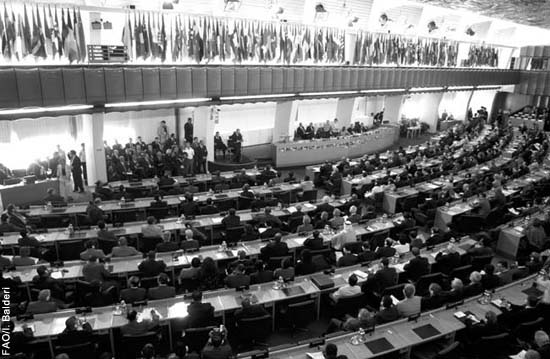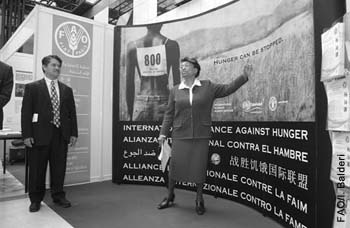| The International Alliance Against Hunger |
| The IAAH seeks to raise public awareness about poverty and about the first Millennium Development Goal's target of reducing by half the number of hungry people by 2015. The Alliance seeks to inform and influence decision makers and opinion makers at all levels-governments, community groups, NGOs, private sector and more. Local groups can be especially effective in spreading the word that global hunger does not make sense. |
| Another key message is that AIDs sufferers who are also undernourished have an even harder time combatting the disease. |
The International Alliance Against Hunger is rapidly becoming an influential global partnership determined to make the fight against hunger and poverty more effective.
Officially launched on World Food Day 2003, the Alliance grew from an idea put forward at the 1996 World Food Summit by German President Johannes Rau. Momentum was added in 2001 when leaders attending the World Food Summit: five years later sought ways to accelerate progress towards the goal of reducing by half the number of hungry people in the world. As the international community now works to meet the Millennium Development Goals - the first of which is aimed squarely at reducing hunger and poverty - still greater meaning is given to the role of the Alliance.
With FAO, WFP, IFAD and IPGRI as its founders, the International Alliance against Hunger counts among its members international NGOs representing some 35 million people, including Action Aid International and the World Association of Girl Guides and Girl Scouts (WAGGGS), as well as religious and social movements such as Caritas Internationalis. The Alliance also works with private companies and entrepreneurs to spearhead national alliances aimed at coordinating the campaign to eradicate hunger at country level.
“We think that everyone is accountable,” said Eva Clayton, FAO Assistant Director-General and special advisor to FAO Director-General Jacques Diouf on the Alliance. “We recognize that joining hands between agencies already committed means that we can be more effective. We are looking at ways of using not just new converts but old converts to the fight against hunger.”
Among NGOs, Johannesburg-based Action Aid has been active in lobbying the industrialized G8 countries to reduce poverty in Africa in efforts complementing those of IFAD, FAO and WFP in the New Partnership for Africa's Development (NEPAD), charting a course to develop agriculture, trade and market access in African nations.
President Rau recognized that the “Millennium Declaration is a pledge by governments which nonetheless is still too abstract for the majority of people in industrialised countries, in spite of intensive information and PR work ...Intensifying partnership initiatives between groups in richer and poorer countries would be a valuable approach.”
Since 2003, support for the IAAH has snowballed, spawning 36 national alliances of which 22 are government-led and 14 led by civil society. A further 53 countries have expressed interest in forming national alliances.
For FAO, the IAAH provides an extremely useful framework for learning from beneficiaries of other agencies' projects what people think they need. Ms Clayton recently was invited to join an IFAD-sponsored mission in India to see the type of project run by the Fund there, talk with participants and see how the national alliance has started work in northeastern Indian states that recently joined.
With its emphasis on smallholders, IFAD's work is more in keeping with the philosophy of the IAAH than with the grandiose national development projects of decades ago, often imposed on people at great expense.
The Rome-based food agencies are the mainstays of the IAAH secretariat and all have financed the IAAH website. The IAAH has no separate budget. It uses existing resources from agency special projects budgets or receives adhoc financing or assistance. One agency has provided the IAAH with a consultant. IPGRI organised a major symposium in India with help from IFAD. The Alliance is a joint effort evolving at many levels.
Some of the national alliances have been started by governments who invited civil society to join in, and others by civil society that drew in government.
In Latin America, Brazil and its President, Luiz Inacio Lula da Silva, are particularly active in the Alliance. President Lula launched a “Zero-Hunger Project” to end hunger within his four years of office. Brazil also has twinned with Haiti to develop a project in that country with FAO, IFAD and WFP participating at the local level. The IAAH participated in seminars held at the World Social Forum in Porto Alegre, Brazil, in January 2005 to promote national alliances.
In the United States, where the Alliance is civil society-led, it sponsored the Hunger Day Advocacy initiative directed at the US Congress and President Bush with involvement by a large number of NGOs and different religious bodies. In January 2004 Bread for the World, an Alliance partner, played a role in winning an increase in US funding for poverty-focused development assistance.
In Madagascar, civil society's involvement in the national alliance is ensured by the participation of Caritas and Catholic Relief Services.

